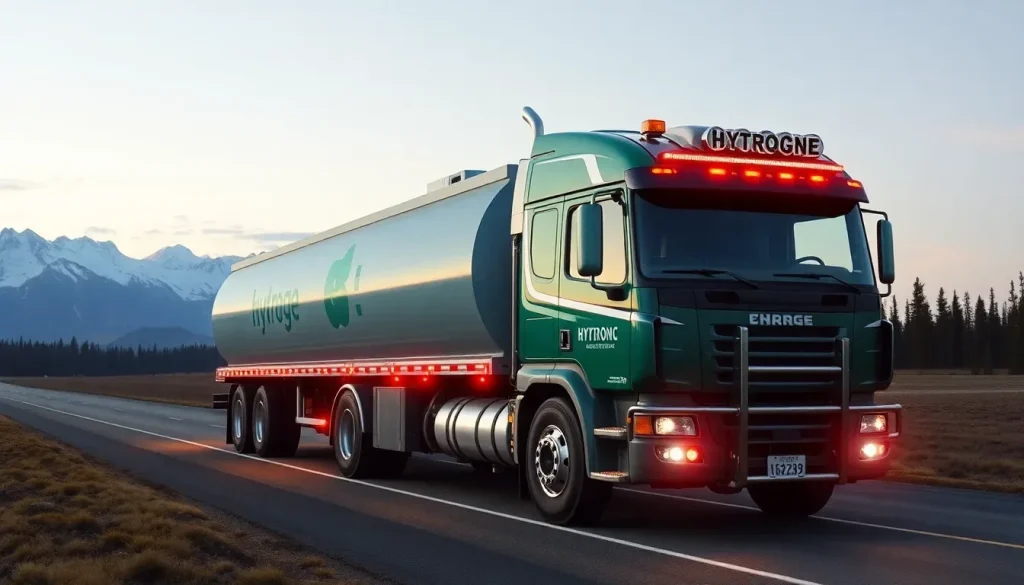Hydrogen Truck Demonstration for Class 8 Underway in B.C.

In an era where sustainability and innovation are becoming imperative in the transportation sector, British Columbia is making significant strides. A recent initiative involving hydrogen-powered trucks marks a pivotal moment in the quest for zero-emission freight solutions. This article delves into the current developments, partnerships, and the broader implications of this pioneering project.
The collaboration between Loblaw Companies, FortisBC Energy, and several strategic partners has initiated the first sustained commercial demonstration of a hydrogen-powered Class 8 truck in British Columbia. This ambitious project is not only a technological advancement but also a critical step toward reducing carbon emissions in heavy-duty transportation.
Overview of the hydrogen truck demonstration
The launch event took place at Loblaw's Marine Drive distribution center, attended by project contributors, industry stakeholders, and government officials. This gathering underscored the importance of collaboration in advancing clean energy technologies. The project kicked off earlier this fall, aiming to demonstrate the real-world performance of zero-emission heavy-duty trucks in daily retail operations.
This hydrogen pilot represents a crucial part of the broader strategy to explore lower carbon and scalable technologies. These efforts are designed to transform how goods are transported across Canada, aligning with national goals for sustainable transportation.
Impact of hydrogen fuel technology on transportation
Since its inception, the hydrogen-powered truck has successfully completed multiple routes between the Lower Mainland and Squamish, logging hundreds of kilometers of zero-emission deliveries. This operational data is vital for understanding the performance, fueling, and operating conditions of hydrogen-fueled vehicles.
Some notable impacts of this initiative include:
- Reduction of Carbon Emissions: The transition to hydrogen fuel technology significantly lowers greenhouse gas emissions compared to traditional diesel trucks.
- Enhanced Efficiency: Hydrogen trucks are designed to operate efficiently over long distances, making them suitable for various commercial applications.
- Data-Driven Insights: The collection of performance data will guide future investments in hydrogen infrastructure and vehicle technology.
Partnerships driving innovation
The project is a collaborative effort involving several key players, including HTEC, the Alberta Motor Transport Association (AMTA), the B.C. Trucking Association (BCTA), Deloitte, Transport Canada, and the province of British Columbia. Notably, Hyundai Motor Company has also contributed, underscoring the significance of multinational cooperation in advancing hydrogen technologies.
Funding for this demonstration includes a $30,000 contribution from FortisBC's Clean Growth Innovation Fund, which is aimed at fostering clean energy projects. Additionally, data collection and analysis are supported through Transport Canada’s Zero Emission Trucking Program, further emphasizing the importance of government involvement in such initiatives. The details of the funding structure are as follows:
| Source | Amount |
|---|---|
| FortisBC Clean Growth Innovation Fund | $30,000 |
| Innovative Clean Energy (ICE) Fund | Variable (details not disclosed) |
Operational insights from the demonstration
The truck is leased from HTEC and refueled at their hydrogen station located on Southeast Marine Drive in Vancouver. This operational framework allows for real-time testing and evaluation of the vehicle’s capabilities under various conditions.
Throughout the course of the demonstration, which extends through late November, the collected data will provide critical insights regarding:
- Vehicle range and efficiency
- Performance under different load conditions
- Operational challenges and solutions
Future of hydrogen transportation in British Columbia
The demonstration serves as a foundation for future developments in hydrogen vehicle technology and infrastructure across British Columbia. The insights gained from this initiative will help inform policy decisions, investments, and the strategic direction for hydrogen energy in the province.
As the demand for sustainable transportation solutions continues to grow, projects like this highlight the potential of hydrogen as a viable alternative to fossil fuels. The commitment from various stakeholders to support this transition showcases the collaborative effort needed to tackle climate change and promote environmental sustainability.
For those interested in further exploring the implications of hydrogen fuel technology, a relevant video titled "Global Debut: Honda Class 8 Hydrogen Fuel Cell Truck Concept" can provide additional context and insights into the innovations taking place in this domain:
Current hydrogen infrastructure in British Columbia
As hydrogen technology continues to evolve, the network of hydrogen stations is becoming increasingly important. Currently, British Columbia has several hydrogen stations operational, with plans for expansion to support the growing demand for hydrogen-powered vehicles.
Some of the current hydrogen filling stations in British Columbia include:
- HTEC's Southeast Marine Drive station, Vancouver
- Station in Burnaby
- Additional stations planned for key locations in the province
Conclusion
The hydrogen truck demonstration in British Columbia is a landmark initiative that exemplifies the potential for hydrogen technology to revolutionize the transportation sector. By fostering partnerships and leveraging data-driven insights, stakeholders aim to pave the way for a more sustainable future in freight operations.
With continued investment and innovation, hydrogen could play a crucial role in achieving Canada’s climate goals and transforming the logistics landscape for years to come.




Leave a Reply